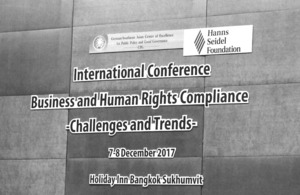- TOP
- 国際人権基準の動向
- FOCUS
- March 2018 - Volume 91
- Business and Human Rights Compliance
FOCUS March 2018 Volume 91
Business and Human Rights Compliance
The “Business and Human Rights Compliance” conference held in Bangkok in December 20171 dealt with the involvement of business in the existing problems of people in the workplace and in the rural communities in Asia.
Plea from the Industry
The representative (Netithorn Praditsarn) of Charoen Pokphand Group Co., Ltd., a big Thai company, discussed the need for a collaborative attitude of all stakeholders (“how to move forward together to realize human rights”), and the lack of capacity of some companies to implement the United Nations Guiding Principles2 (due to costs and difficulty in operationalizing the human rights principles in the company systems). He also mentioned the difficulty of monitoring foreign workers due to lack of control of employment agencies in the countries of origin.
Practical issues such as capacity of companies to implement the UNGP and the capacity of affected stakeholders (including the workers and members of the community adversely affected by company operations) to protect their human rights are determinative of the realization of human rights in the field of business as a whole.
Is collaborative attitude among all stakeholders the proper approach to address the current human rights issues affecting business, and to avoid such problems from occurring again in the future?

Current Issues
Business-related human rights issues in Asia are not different from the issues addressed decades ago by the Asian non-governmental sector. Their current forms continue to be land issues (non-recognition of customary land rights, displacement of land owners, land registration system that cause loss of land), exploitation of water resources ranging from building dams (such as those on the Mekong river) to sea-polluting industries, and exploitative labor conditions (affecting both local and foreign workers). In a number of cases cited at the conference, government support was a major part of the problems such as in the development of hydropower dams on the Mekong river and the displacement of communities (physical as well as livelihood displacement) in government projects (with the business sector involvement).
The problems of migrant workers and unethical recruitment practices are persistent in Asia. Migrant work is a big business for both recruitment agencies and employers in countries of destination (such as palm plantation companies in Malaysia and Thai seafood companies). The discussion in the conference on exploitation of local labor included problems in garment factories in Myanmar, Cambodia and China, and sugarcane plantations in Cambodia.
The persecution of people who expose these problems remains a recurrent problem that has to be addressed alongside the promotion of the UNGP.
Applying the UNGP
The application of the UNGP on the issues presented has two sides. The first, on the business side, is the voluntary adoption by companies of human rights policies and mechanisms to govern their operations (both at the internal and field levels). The reality however shows that many companies declare subscription to the UNGPs but do not guarantee their compliance with their commitment to respect human rights. Thus there is a need for monitoring systems or watchdogs to pressure the companies to fully comply with their commitment.
The other side is that of the workers and the members of the communities adversely affected by company operations. For these people, the third pillar of the UNGP plays an important though not exclusive role.
A case study on the efforts of Thai rural communities (with the support of non-governmental organizations) along the Mekong river to stop government projects on the river showed both the variety of mechanisms to employ (judicial and administrative, within and outside Thailand) and the difficulty of getting these mechanisms to address the problem.
The discussion at the 2017 United Nations Forum on Business and Human Rights on the third pillar (access to remedy) of the UNGP was a relevant input in the conference. The Geneva forum noted the need to treat the third pillar not as one pillar but as part of the two other pillars.
During the open forum, it was stressed that indeed much of the problems relate to the “local.” The problems of applicants for overseas employment starts with the exploitative local recruitment agencies that put the workers in debt before leaving the country, and in danger in the country of destination.
At the same time, local remedies were crucial in addressing the problems. Thus the need to work with local NGOs (including lawyers) that assist communities and workers in holding companies liable for the abuse of their human rights.
The German-Southeast Asian Center of Excellence for Public Policy and Good Governance (CPG) based in the Faculty of Law Thammasat University organized the conference in cooperation with the Hanns Seidel Foundation, Bangkok/Laos Office.

Jefferson R. Plantilla is the Chief Researcher at HURIGHTS OSAKA.
For further information on the proceedings of the conference, please contact the German-Southeast Asian Center of Excellence for Public Policy and Good Governance (CPG), ph (66 2) 613 2971; e-mail: contact[a]cpg-online.de; www.cpg-online.de.
Endnotes
1 Materials of the panelists in the conference are available at
www.cpg-online.de/2018/01/03/business-and-human-rights-compliance-challenges-and-trends/.
2 Guiding Principles for Business and Human Rights: Implementing the United Nations “Protect, Respect and Remedy” Framework, for the full text of the document see www.ohchr.org/Documents/Publications/GuidingPrinciplesBusinessHR_EN.pdf.
